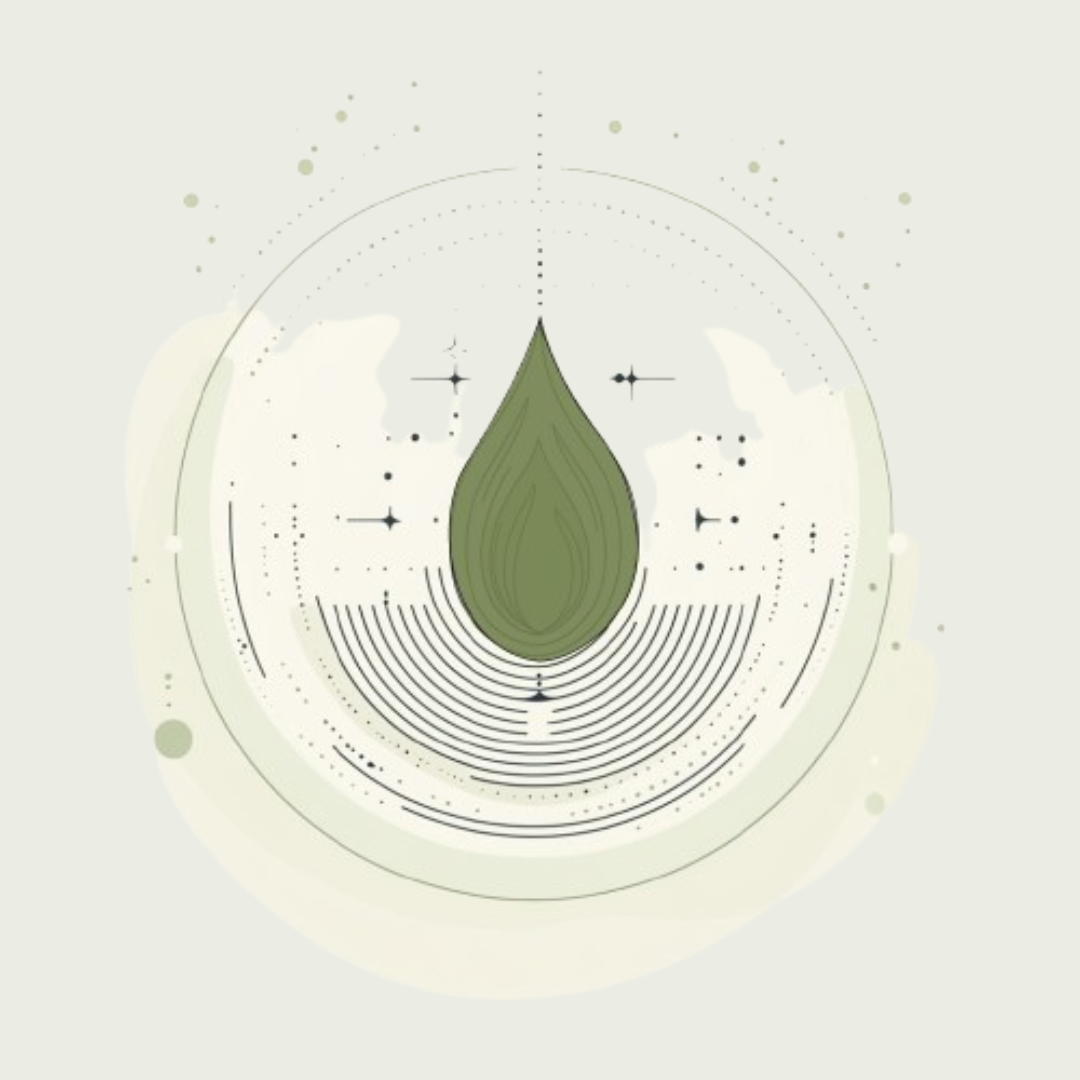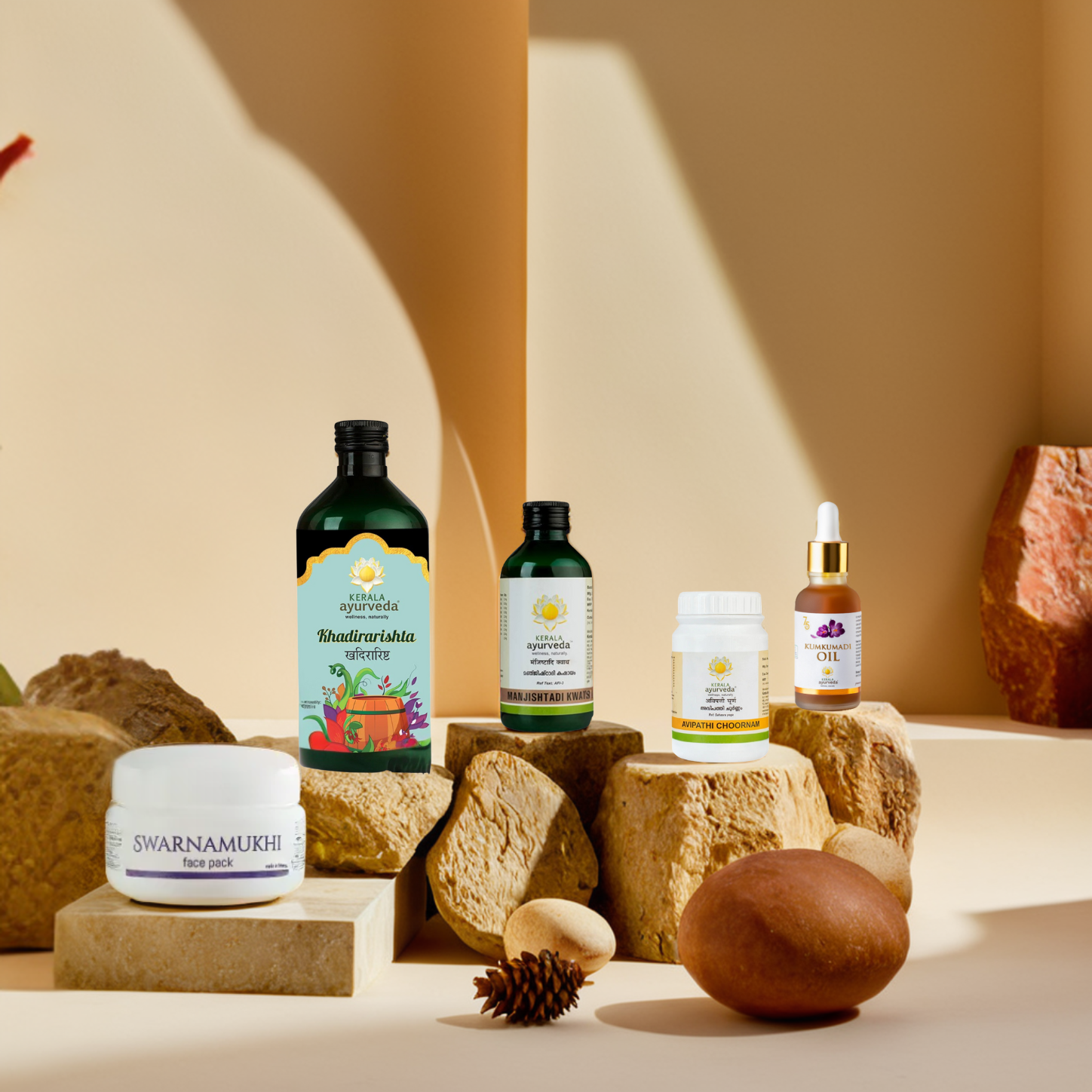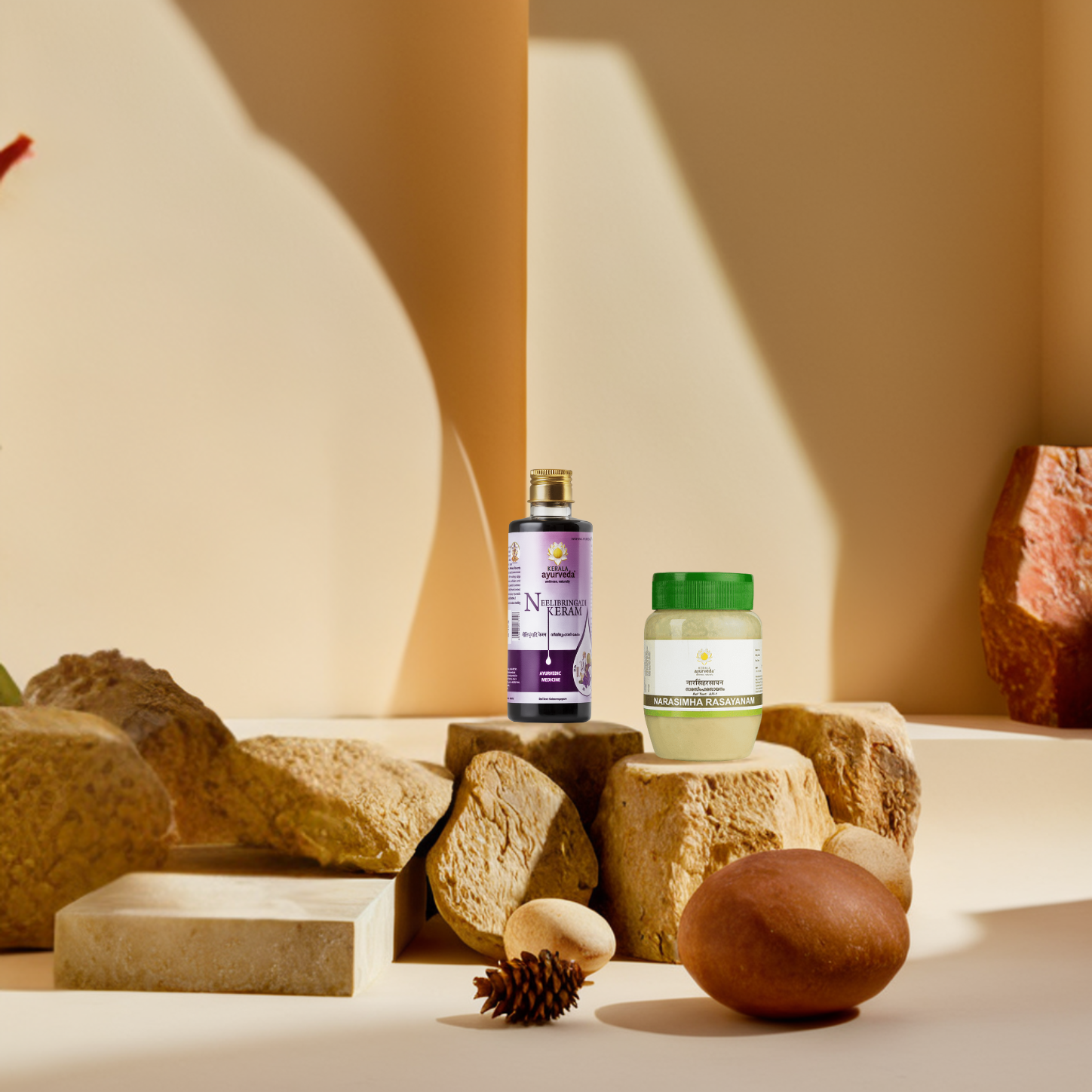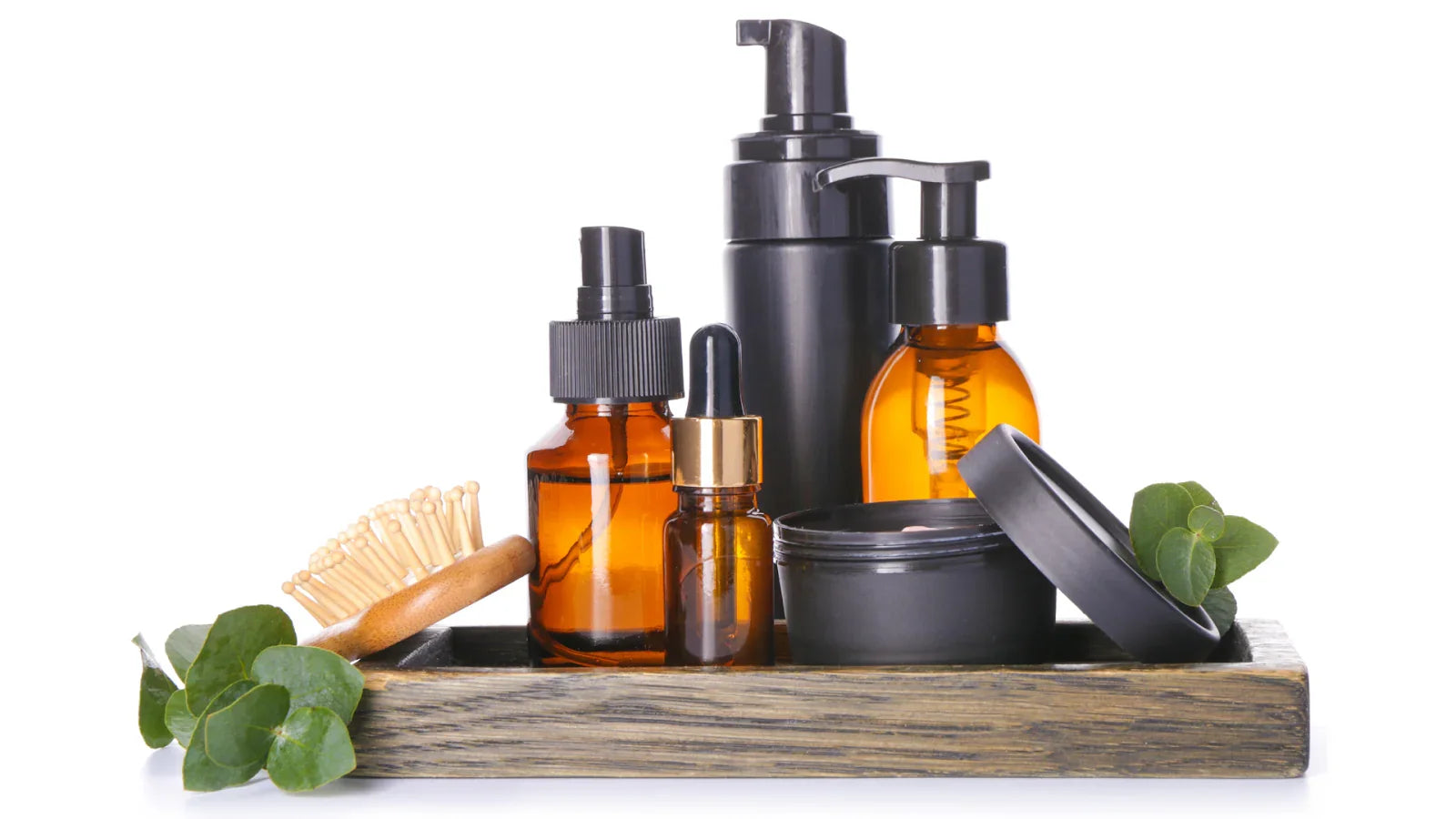Highlights
Ever felt that sudden worry when you see more hair on your pillow or in your comb?
When you think about it, our hair is such a big part of how we feel about ourselves, so it's natural to want it to look and feel its best. But with things like our diets, the environment around us, and just the everyday stresses of life, our hair can sometimes suffer, leading to hair fall, greying, or thinning. And those hair products we see everywhere? Sometimes they're packed with things that might not be so great for us in the long run, often just giving a quick fix without really getting to the heart of the matter.
This is where the Ayurvedic treatment process is beneficial to combat hair fall and hair loss. For generations, Ayurveda has provided a comprehensive understanding of the body's interconnectedness holds valuable keys to achieving healthy hair.
In this blog, we will explore how Ayurveda sees hair fall and how following its age-old principles and practices, along with trusted products rooted in this tradition, can help you rediscover the joy of strong, healthy hair.
What Does Hair Fall Really Mean in Ayurveda?
In the Ayurvedic view of the body, your hair health reflects the unique combination of three doshas, Vata (associated with air and space; linked to dryness and brittleness), Pitta (associated with fire and water; linked to heat, inflammation, and premature greying), and Kapha (associated with earth and water; linked to oiliness and thickness), in your system. Your hair will likely reflect characteristics of more than one dosha.
Once you understand the characteristics of these hair types, you will be able to find which one suits you best:
1. Vata-type hair
Healthy Vata-type hair is relatively thin in volume but tends to be coarse in texture. It grows rapidly and is usually curly, straight, or somewhere in between. Owing to its rebellious nature, it can often be difficult to tame and style as you wish.
For Vata-type hair experiencing fall, a consistent daily routine and regular oiling with warm sesame or almond oil are key. Favoring warm, nourishing foods while reducing caffeine intake can also help.
2. Pitta-type hair
Healthy Pitta-type hair tends to be moderately thick, soft in texture, and straight in appearance. While it is easy to style, individual strands tend to be fine.
Pitta-type hair fall benefits from cooling the scalp with coconut oil massages and staying well-hydrated, with Amalaki paste being a useful remedy alongside a cooling diet of fresh produce.
3. Kapha-type hair
Healthy Kapha-type hair is coarse in texture and tends to be very full and thick in volume. It is usually curly in appearance and often considered the most desirable type of hair.
Kapha-type hair prone to fall needs regular washing to manage oiliness, weekly massages with mustard or olive oil, and herbal cleansers, with Triphala rinse as a beneficial addition.
When considering changes in your hair health, remember your natural hair type based on long-term patterns before damage occurred. Ayurvedic treatment aims to encourage your natural hair type to be in its best and healthiest state, not to alter it.
What are the Root Causes of Hair Fall?
From a classical Ayurvedic lens, hair fall is often a result of internal and external factors that disrupt Dosha balance. Some of the key contributors include:
- Poor digestion (Agnimandya): Toxins (Ama) from undigested food can accumulate in the body, weakening tissue nourishment.
- Nutrient-deficient diet: Lack of iron, protein, and healthy fats leads to hair weakening.
- Stress and anxiety: Mental strain disturbs Vata, which controls movement and nervous function.
- Sleep imbalance: Irregular or insufficient sleep weakens rejuvenation processes.
- Excessive use of chemicals: Harsh shampoos and hair treatments strip the scalp of its natural oils.
- Hormonal shifts: Pregnancy, menopause, or thyroid imbalances impact the Shukra Dhatu and Rasa Dhatu, which are essential for hair health.
Once you understand these patterns, it’s easier to seek solutions that actually fix the root cause of hair fall.
Top Ayurvedic Hair Oils to Manage Extreme Hair Fall
Kerala Ayurveda has a wide range of hair care products made using authentic Ayurvedic principles, all designed to help with common concerns like hair fall. Instead of just masking the problem, they aim to support your body from within. The herbs used are known for their natural strength, helping to nourish your scalp, strengthen the roots, and reduce hair fall in a lasting way. Here are some of their most trusted and effective products:
1. Neelibringadi Keram
This all-in-one hair treatment addresses dandruff, hair fall, and scalp irritation while nourishing your hair from root to tip. This potent formulation harnesses the synergistic power of ingredients such as Neelini (Indigo) and Bhringaraja, working harmoniously to deeply nourish the scalp and hair follicles.
2. Kesini Oil
A specially created and proprietary Ayurvedic oil meticulously formulated to address a diverse range of hair problems, including the distressing issue of hair fall, the bothersome presence of dandruff, and persistent dryness. This efficacious oil often incorporates a powerful blend of potent herbs. Hibiscus improves hair texture and reduces dryness, Castor Oil promotes thicker hair growth, and Amla nourishes and revitalizes the scalp.
3. Virgin Coconut Oil
It is a pure, high-quality coconut oil known for its antibacterial and antifungal properties, and can further enhance results. Its natural composition helps fight scalp infections, including dandruff, while improving blood circulation to the region. Its inherent cooling properties can be particularly beneficial in balancing the Pitta dosha, often implicated in hair thinning and loss.
How Ayurveda Rejuvenates Hair Growth?
Ayurveda emphasizes that healthy hair growth and its sustenance depend on the strength of specific bodily tissues or Dhatus, namely Rasa (plasma), Rakta (blood), and Asthi (bones). Nourishing and strengthening these tissues is considered essential for the growth of strong and healthy hair. To actively control hair fall and encourage rejuvenation, Ayurveda recommends incorporating specific daily rituals:
- Shiro Abhyanga (Head Massage) with Ayurvedic Oils: This age-old practice involves gently massaging the scalp with specific Ayurvedic oils. This ritual is known to stimulate blood circulation in the scalp, deeply nourish the hair roots, and effectively balance the Vata and Pitta doshas, all of which are vital for healthy hair growth. For optimal benefits, it is recommended to perform this massage in the morning or before bedtime at least two to three times a week.
- Nasya Therapy: This therapy involves administering medicated oils into the nostrils. While seemingly subtle, it is believed to lubricate the nasal passage and strengthen brain function, which can have a positive impact on addressing hair fall, particularly that induced by Vata imbalances, as well as reducing mental stress.
- Calm the Mind: Ayurveda recognizes the significant impact of mental and emotional well-being on physical health. Emotional stress is believed to weaken Ojas (vital energy), which is crucial not only for a robust immune system but also for maintaining the strength and vitality of hair.
- Balance Vata and Pitta Dosha: According to Ayurveda, imbalances in the Vata and Pitta doshas are primary factors contributing to excessive hair fall. By adopting a diet, incorporating specific herbs, and using oils that effectively soothe these aggravated doshas, Ayurveda aims to address the problem at its root cause.
- Diet & Lifestyle Adjustments: Ayurveda emphasizes that your daily habits play a significant role in your hair health. Recommended adjustments include:
- Consuming freshly cooked, warm meals that include healthy fats such as ghee.
- Incorporating specific herbs known for their beneficial effects on hair, such as Amalaki, Bhringraj, Brahmi, and Ashwagandha, into your daily routine.
- Prioritizing deep and restful sleep and reducing screen time, especially after sunset, to support the body's natural healing and rejuvenation processes.
- Practicing yoga and meditation regularly as effective ways to calm the nervous system and manage stress levels, both of which can positively influence hair health.
Conclusion
In essence, Ayurveda offers a holistic and time-tested approach to understanding and addressing hair fall by focusing on the body's internal balance and overall well-being. By recognizing your individual constitution, adopting appropriate lifestyle adjustments, and incorporating natural remedies, you can take meaningful steps towards achieving healthier, stronger hair from the inside out.
To support your journey towards revitalized hair, Kerala Ayurveda offers a thoughtfully curated range of Ayurvedic hair care products rooted in traditional wisdom and prepared with authentic herbs. Explore our selection to find natural solutions that can complement your Ayurvedic practices and help you nurture your hair back to its natural vibrancy.
FAQs
1. Can I use Ayurvedic herbal hair oil daily?
Daily oiling may clog hair follicles and lead to buildup. It's best to oil your hair once a week, or 2–3 times a week if you have a dry scalp.
2. Should I leave Ayurvedic hair oils overnight?
Yes, ideally apply the oil at night and wash it off the next morning with a gentle, natural shampoo suited to your hair type.
3. Should I use hot water or cold water to wash my hair?
Washing your hair with hot water can dry out your hair, causing more problems. So, it is recommended you use warm water for body showers and lukewarm water to wash your hair. This will seal in the moisture and add shine to your hair.
4. Do Ayurvedic oils help with split ends?
They nourish the scalp and improve circulation, which helps reduce split ends and breakage. For best results, pair oiling with healthy lifestyle habits.
5. What are some best Ayurvedic oils for dandruff?
Kesini Oil, Neelibringadi Keram, and virgin coconut oil from Kerala Ayurveda have anti-dandruff properties that help cleanse and soothe the scalp.
6. Can Ayurveda regrow lost hair?
It depends on the cause. Ayurveda can help regrow hair if the loss is due to nutritional deficiencies, thyroid issues, or scalp conditions, but not if the follicles are permanently damaged.
7. How to get thicker hair in a month?
Use cooling oils like coconut or mustard oil to nourish the scalp and reduce hair fall. Try herbal cleansers and apply Triphala paste twice a week for long-term results





